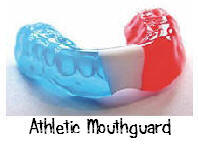What is an athletic mouthguard?
 A mouthguard is a flexible appliance made out of plastic that is worn in athletic and recreational activities to protect your child's teeth from trauma. When your child begins to participate in recreational activities and organized sports, injuries can occur. A properly fitted mouthguard is an important piece of athletic gear that can help protect your child's smile.
A mouthguard is a flexible appliance made out of plastic that is worn in athletic and recreational activities to protect your child's teeth from trauma. When your child begins to participate in recreational activities and organized sports, injuries can occur. A properly fitted mouthguard is an important piece of athletic gear that can help protect your child's smile.
Mouthguards help to prevent broken teeth, and injuries to your child's lips, tongue, face, or jaw. A properly fitted mouthguard will stay in place while your child is wearing it, making it easy for him/her to talk and breathe.
While playing many types of sport activities, oral injuries are common with more than 200,000 injuries to the mouth and jaw occurring each year. Wearing a mouthguard can prevent dental trauma as well as other very serious injuries such as concussions, cerebral hemorrhages, jaw fractures, and neck injuries by helping with the absorption of the shock of your child's lower jaw forcefully jamming into his/her upper jaw. A mouthguard will also help move soft tissue in the mouth away from your child's teeth.
In any sport where there is a strong chance for contact with other people, it is advisable for your child to wear a mouthguard. These sports include, but are not limited to: basketball, softball, football, wrestling, soccer, lacrosse, rugby, in-line skating, martial arts, and skateboardng.















